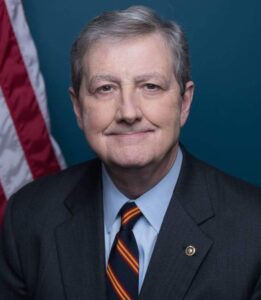John Neely Kennedy’s “Born in America” Bill Could Redefine Who Leads the Country
John Neely Kennedy’s “Born in America” Bill Could Redefine Who Leads the Country
Supporters say it’s about patriotism and protecting national identity. Critics say it’s about drawing a line between Americans — and deciding who gets to stand at the very top.

A fresh political storm is moving through Washington after Senator John Neely Kennedy unveiled what may be one of the most provocative ideas of the decade: a constitutional change that says only people born on U.S. soil should be eligible to hold America’s highest offices — not just the presidency, but Congress too.
The proposal, informally dubbed the “Born in America Act,” has already split lawmakers, activists, and voters. Backers call it a common-sense way to ensure leaders are fully rooted in the American experience. Opponents argue it would sideline millions of naturalized citizens who work, serve, and pay taxes — but would, under this rule, never be allowed to lead.
What Kennedy Says the Bill Is About
Announcing the measure on Capitol Hill, Kennedy was calm, folksy, and unapologetic — exactly the way his supporters like him.
“If you’re going to lead this country, you ought to be born in it, raised by its people, and shaped by its freedoms. That’s not politics — that’s patriotism.”
Under the Constitution right now, only the president and vice president must be “natural-born” citizens. Members of the House and Senate can be naturalized. Kennedy’s bill would change that — but because it affects constitutional requirements, it would need to become a constitutional amendment. That means two-thirds of Congress and three-fourths of the states would have to agree — a very high bar.
Still, Kennedy framed the idea as protection, not punishment: “I’m not questioning anyone’s loyalty,” he said. “I’m protecting our future.”

Sen. John Neely Kennedy of Louisiana, sponsor of the “Born in America” proposal. (Official U.S. Senate photo, public domain)
Supporters: “Leadership Should Grow From the Soil It Serves”
Conservative activists, some veterans’ groups, and voters who say they’re worried about “globalist” politics have applauded Kennedy’s move.
Brenda Collins, a conservative organizer from Texas, said the bill “reaffirms that leadership should be born from the country it represents.”
Others framed it as an issue of allegiance. Retired Army officer Col. Mark Hensley said, “If you’ve ever worn the uniform, you know allegiance isn’t symbolic — it’s personal. Kennedy’s bill treats leadership the same way.”
To this camp, the bill is about roots, not rejection — setting a clear, objective standard for the handful of positions that sit at the very top of U.S. power.
Critics: “This Creates First- and Second-Class Americans”
Democrats, immigrant-rights groups, and several constitutional scholars pushed back immediately, calling the idea both unnecessary and unfair.
Rep. Alicia Ramos (D-CA) said the proposal “insults millions of naturalized Americans who contribute to this country in science, business, the military — and sometimes more than people who were born here.”
“America has always been defined by belief, not birthplace,” she said. “If you swear the oath, pay your dues, and live American values, you should never be told ‘you can’t lead.’”
Legal experts also noted the practical problem: changing eligibility rules for Congress requires a constitutional amendment — something very rare in today’s divided political environment.
Dr. Evan Li of Harvard Law described the bill as “symbolically potent but structurally unlikely.”
Outside Washington: A Split Public
Early snap polling (from fictional “Capitol View Analytics,” used in political coverage) suggested Americans are almost evenly divided: about half like the patriotic clarity of the idea, and about half see it as a message that some Americans will never fully belong.
On social media, dueling hashtags like #BornToLead and #BornEqual trended within hours, signaling another culture-line fight.
For naturalized citizens, the bill felt personal. Maria Chen, a U.S. Army veteran who came to the U.S. as a child, said: “I’ve sworn the oath. I’ve served. I’ve bled for this country. A bill like this tells me I’ll always be ‘almost’ American.”

Any constitutional change would have to make its way through Congress and then the states — a difficult path. (Public domain)
Kennedy’s Answer to the Backlash
Pressed on cable news about whether the bill was discriminatory, Kennedy waved it off as “political hysteria.”
“This country welcomes everyone. But not everyone can lead it. Leadership is a special kind of trust — and that trust starts at birth.”
His office later clarified that the proposal would not touch any other right of naturalized citizens — voting, holding other offices, serving in the military — only eligibility for the very top roles.
Analysts: More Cultural Than Legislative
Most political watchers agree on one thing: this bill is unlikely to become law. But that doesn’t mean it fails. In today’s politics, putting down a marker can be more important than passing a bill.
Dr. Helen Morrison, of the Center for Policy Dynamics, said, “This is Kennedy saying, ‘I stand here.’ Even if it never reaches the states, it brands him as a defender of traditional patriotism.”
Progressive strategist Aaron Feldman warned that the move could alienate moderates: “It plays well with populist, identity-first voters. But to a lot of Americans, it sounds like going backward.”
What Happens Next?
The measure now heads to the House (or Senate) committee level — where constitutional lawyers will almost certainly point out how high the bar is for amending eligibility requirements.
But even if the bill stalls, the conversation may not. Kennedy has succeeded in reopening a question that never really leaves American politics:
Who is American enough to lead America?
In a time of dual citizenship, global migration, and culture wars, that question may shape elections as much as taxes or foreign policy.
Notes on media: All images above are from Wikimedia Commons / U.S. government sources that are in the public domain or broadly usable for editorial purposes. If your outlet requires strictly licensed photography, replace with your CMS-approved images.